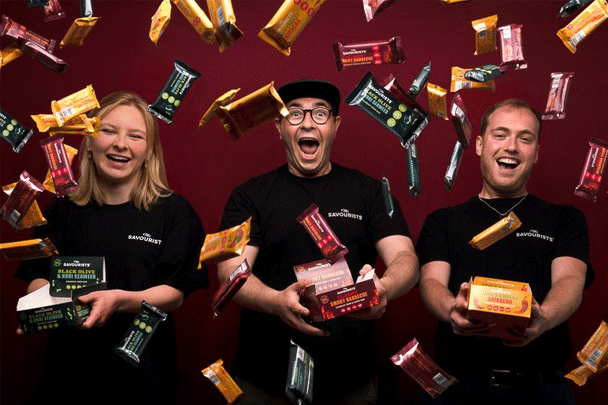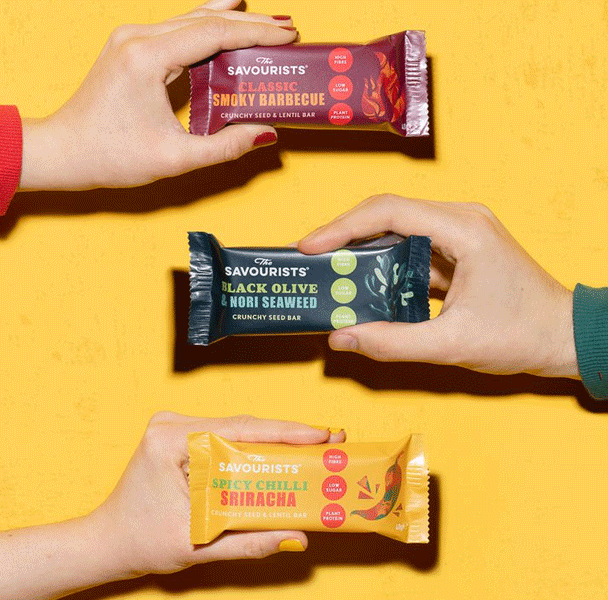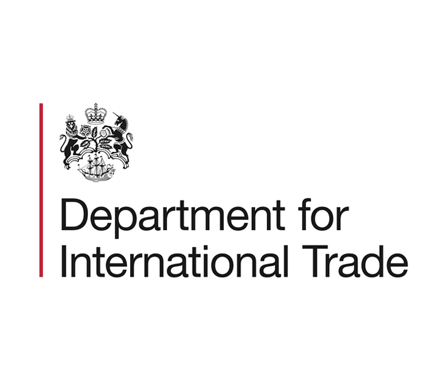
The Savourists are proof that export is a viable route to market for SMEs. Founder Harry Turpin talks to us about their exporting journey providing tips to other SMEs who wish to export and his recent experience at Number 10.
They are the saviours of savoury, creating umami snack bars that are packed with plant-based protein and fibre, low in sugar and gluten free.
Since launching in 2019, their products can be found in Planet Organic, Wholefoods, Sainsbury’s, Amazon and other marketplaces and they even export to Coop in Switzerland. We speak to founder Harry Turpin about his route to market strategy and how he has capitalised on growth opportunities.

What’s the story behind The Savourists?
The idea for The Savourists came about when I noticed the protein-bar market was over saturated with sweet products that were an extension of the confectionary market and low on nutritional value. I wanted to create an eye-catching savoury brand, known for tasting good and that would appeal to retail buyers.
It took two years of development to get the product from idea to shelf. We developed the products with a chef and tested it with friends and family before finding a buyer. I found manufacturers through Google and simply travelled around to meet them as well as using my network from previous industry roles to help with legal and compliance requirements.

A lot of people don’t know this, but exporting is possible even if you only have one or two products, you don’t need to be a larger corporation to do so...due to the pandemic, we probably ventured down the export route earlier than anticipated."
Harry Turpin
The Savourists

How did the idea to export come about?
I’ve learnt from previous roles about having a spread-bet strategy of 30 per cent margins across multiple channels. This strategy minimised the business risk should one channel have delays or not work out.
Our core routes to market were direct to consumer through Amazon, pitching to retailers in the grocery sector and exploring export opportunities. A lot of people don’t know this, but exporting is possible even if you only have one or two products, you don’t need to be a larger corporation to do so.
What stage where you at in your business journey when the idea to export came about?
We launched in 2019 and were exporting by 2020, so we started exporting fairly early in our business journey.
Due to the pandemic, we probably ventured down the export route earlier than anticipated. Our initial strategy was to get Shoreditch buzzing with the products and build awareness with consumers face to face, but we’ve had to put that on hold and opt for other routes to market instead.
What was the first step you took to explore this route to market?
Through the SME community provided by Bread & Jam’s Food Hub on Facebook. It was also recommended to create an account and set up a business page on the Department for International Trade’s (DIT) site for exporting opportunities. This free service acts like a speed-dating site and promotes your products and matches you to overseas buyers. It’s available to any business no matter how small you are or how many products you have.
As a result, I was approached by a distributor on behalf of Coop in Switzerland, and couldn’t turn down the opportunity. Although the Coop’s listing fees were high, it was worth it. We now focus on cherry picking the right distributors to do exporting well in a small part of Europe, rather than saying yes to any random supermarket.

...if I had gone anywhere other than GS1 UK, I wouldn’t have been able to trade on Amazon, overseas or through retailers and would have lost thousands of pounds in repackaging costs."
Harry Turpin
The Savourists
How have GS1 standards enabled your exporting journey?
I found out about GS1 barcodes through Bread & Jam’s Food Hub community on Facebook. It was initially a little daunting getting a barcode, as there are more options than I realised. Getting it right first time was essential.
It turns out there are quite a few barcode resellers, and if I had gone anywhere other than GS1 UK, I wouldn’t have been able to trade on Amazon, overseas or through retailers and would have lost thousands of pounds in repackaging costs.
Their support team was exceptional and provided a wealth of knowledge about barcodes and their importance to my route-to-market strategy. By having a GS1 barcode, my product data is now standardised through the GS1 system, so filling out new-line forms for retailers is extremely easy and my data is the same no matter what platform it’s being viewed on. The GS1 barcode works globally, so I have the confidence that I’ll be able to trade seamlessly across all my channels.
Any tools or resources you’d recommend?
As someone with a food and beverage background, I count myself lucky to have mentors within the industry who have been there and done it already. As a whole, the industry is full of friends and allies where it’s easy to connect with those not competing in the same space.
As previously mentioned, the Food Hub on Facebook has been amazing and pointed me in the direction of GS1 UK and DIT, without whom I wouldn’t be exporting. It’s a supportive community of emerging and scaling food and drink entrepreneurs, who share advice, insights, contacts and their own business experiences. It’s hosted by Bread and Jam, who also run lots of workshops, Monday Motivations sessions and networking events to support growth opportunities.
Young Foodies are another great organisation who offer a wide variety of services and training to challenger food and drink brands.
The latest social media network to emerge, Clubhouse, is fantastic, and my favourite group to engage with is “Pitching”, where I ensure to put a question in every day. I’d like to run more events on Clubhouse, similar to podcasting, where you can be anywhere and just show up and use audio to draw on an audience as much as possible.

Only 10 per cent of UK businesses export, but realistically it should be so much more given the help that’s available."
Harry Turpin
The Savourists
You recently got invited to 10 Downing Street to discuss international trade. What key points did you raise and what insights can you share with us?
It was an amazing experience. I felt very lucky to join this session and thank GS1 UK and Enterprise Nation for the opportunity. I felt privileged to be invited and be a voice for small brands when it comes to exporting. I was left impressed by Alex Hickman and his knowledge about everything going on in the various departments. Only 10 per cent of UK businesses export, but realistically it should be so much more given the help that’s available. The government genuinely do want help, and to gain insight, improve opportunities and support small businesses for export.

I've used DIT a lot for exporting to Switzerland with The Savourists, and when I worked at Cawston Press, which made navigating the website a little easier. A key improvement I raised was to change the tone of voice and information on their website for the SME audience, as it’s currently geared towards corporate businesses and can be confusing.
Encouraging SMEs to export is a new focus, so updates are required to provide SMEs with a clear, actionable plan and practical guidance through the process.
A lot of what was discussed was around financial support for export and international trade. As a business, you have to take into account freight costs and margins to make it worth your while. I put forward the idea for a small grant that businesses can apply for to pay for one-to-one consultations from an approved list of export consultants.
The final takeaway from the session was around the practicalities of Brexit and how that affects exporting. You need to have an EU address on your packaging for exporting, and for that, you need an EU base, which most small businesses won’t have or be able to afford. A way around this is to register the business with a distributor in the EU and use them as your office.

